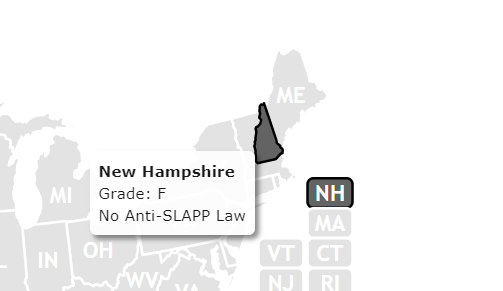I’ve already noted elsewhere that I’d like the ‘Grok to have a steady Domestic Alexa rank of 10,000 by year’s end. We’re getting closer, and it’s only September which means I should ask for something else. How about an Anti-SLAPP law for the Granite State?
We don’t have one. The Public Participation Project, a group dedicated to protecting Free Speech, gives New Hampshire a letter grade of “F” on the matter. Given the makeup of the legislature, there’s no time like the present to get this done.
And why would we want an Anti-SLAPP Law? See for yourself.
For our growing army of readers outside New Hampshire, you can check your state’s scorecard here.
SLAPPs are Strategic Lawsuits Against Public Participation. These damaging suits chill free speech and healthy debate by targeting those who communicate with their government or speak out on issues of public interest.
SLAPPs are used to silence and harass critics by forcing them to spend money to defend these baseless suits. SLAPP filers don’t go to court to seek justice. Rather, SLAPPS are intended to intimidate those who disagree with them or their activities by draining the target’s financial resources.
SLAPPs are effective because even a meritless lawsuit can take years and many thousands of dollars to defend. To end or prevent a SLAPP, those who speak out on issues of public interest frequently agree to muzzle themselves, apologize, or “correct” statements.
If you are still unsure why we should have one, read this.
Anti-SLAPP laws are meant to provide a remedy to SLAPP suits. Anti-SLAPP laws are intended to prevent people from using courts, and potential threats of a lawsuit, to intimidate people who are exercising their First Amendment rights. In terms of reporting, news organizations and individual journalists can use anti-SLAPP statutes to protect themselves from the financial threat of a groundless defamation case brought by a subject of an enterprise or investigative story.
Under most anti-SLAPP statutes, the person sued makes a motion to strike the case because it involves speech on a matter of public concern. The plaintiff then has the burden of showing a probability that they will prevail in the suit — meaning they must show that they have evidence that could result in a favorable verdict. If the plaintiff cannot meet this burden and the suit is dismissed through anti-SLAPP proceedings, many statutes allow defendants to collect attorney’s fees from the plaintiff.
Anti-SLAPP laws disincentivize nuisance or meritless lawsuits by turning lawfare on its head. Instead of using the burden of legal fees and court costs to silence opinion or dissent, it can put accusers on the hook for the cost of these frivolous accusations.
And we need that now more than ever.
The world has become increasingly hostile to free speech and public speech. And while we may not yet have an abundance of cases in the Granite State to suggest the law is needed, the absence of such protections invites them.
An anti-SLAPP law also creates an opportunity to test every legislator’s commitment to free and open political debate. In an election year, that seems like a winning plank on every platform. Anyone that opposes it invites opprobrium as the political price that should come with not doing anything and everything to ensure free expression is protected.
How many State Legialtors read GraniteGrok? A lot.
So, what say you.
Lawmakers, Lawmakers, Make me a Law.
And yes, I know it won’t be the law by Christmas, but it could be an LSR that’s been assigned a bill number. And that’s good enough for me.
